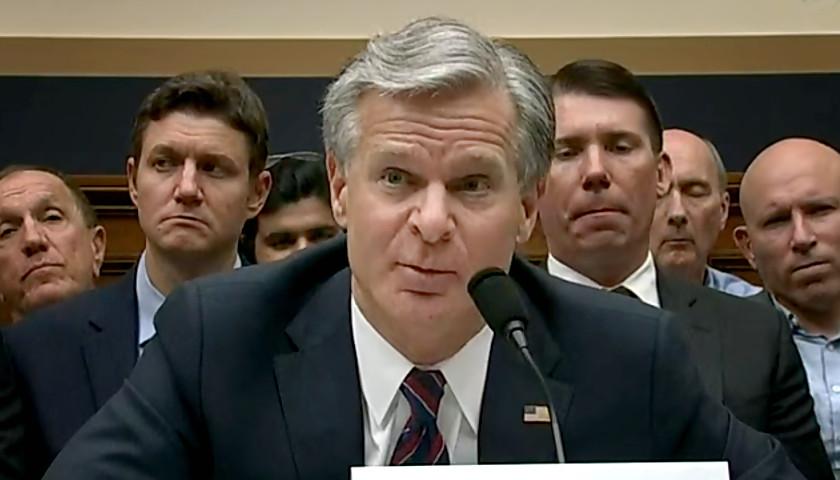by Steven Richards
Seven years into his tenure, FBI Director Christopher Wray faces an uncertain future as President-elect Donald Trump has already chosen a successor, and Congress grapples with his record presiding over a series of scandals that tarnished the reputation of the nation’s premier law enforcement agency and lowered its public trust.
Under Wray’s watch, the FBI has retaliated against whistleblowers who raised concerns about bureau policy, used its investigative authority to pursue traditional Catholics and parents, failed to address a pervasive sexual harassment problem at the bureau, and used political criteria to adjudicate security clearances.
Wray was appointed to head the Federal Bureau of Investigation after then-President Trump fired Director James Comey over his handling of the probe his one-time Democratic rival Hillary Clinton. The new director took office as a bureau probe into the 2016 Trump campaign for alleged Russia collusion was transferred to a special counsel, former FBI Director Robert Mueller.
Though Trump originally selected Wray to lead the bureau, the president-elect has announced intentions to replace the FBI director with another candidate, former congressional investigator and executive branch official Kash Patel.
Patel has secured the public support of several Republican senators, who will vote to confirm the nominee. But, some senators have expressed hesitancy or concerns about replacing Wray in light of Patel’s sweeping plans to reform the bureau, including a plan to shut down the D.C. headquarters and prosecute leakers.
Some Republicans pushed back on these ideas and signaled that they would thoroughly vet Patel before voting to confirm him to the role. One senator, Mike Rounds, R-S.D., defended Wray’s tenure when asked about whether or not he’d vote to confirm Patel.
“Chris Wray, who the president nominated the first time around — I think the president picked a very good man to be the director of the FBI when he did that in his first term,” Rounds said during an interview with ABC News. “When we meet with him behind closed doors, I’ve had no objections to the way that he’s handled himself, and so I don’t have any complaints about the way that he’s done his job right now.” Rounds said he would assess Patel’s nomination and carry out his duty as a Senator to advise and give consent to the president’s picks.
Retaliation against whistleblowers
In recent years during Wray’s tenure, multiple whistleblowers from the bureau have come forward claiming FBI leadership retaliated against them for making protected disclosures to Congress or raising concerns directly with supervisors.
At least three whistleblowers came out publicly —including Marcus Allen, Garrett O’Boyle, and George Hill—alleging that they were subjected to retaliation after raising concerns internally, and later to Congress, about the FBI’s pursuit of January 6 suspects, investigation of pro-life Americans following the overturning of Roe v. Wade, and other issues.
O’Boyle, for example, said that he was suspended following protected disclosures to Congress about his concerns the bureau was improperly targeting pro-life activists in the wake of the Supreme Court’s decision to overturn Roe v. Wade. For years, the bureau withheld pay and left his family in limbo after they moved to the Washington, D.C., area at the FBI’s behest.
Marcus Allen raised concerns specifically about the accuracy of Director Wray’s testimony to Congress about the Jan. 6, 2021, Capitol riot and linked sources the bureau later determined to be “extremist propaganda.”
In his emails to FBI officials, Allen had suggested they use “extreme caution and discretion in pursuit of any investigative inquiries or leads pertaining to the events of” Jan. 6. Like O’Boyle, Allen was suspended without pay and had his security clearance revoked. He ultimately settled with the bureau, his clearance was restored, and then he resigned from the agency.
Politicized security clearance reviews
The agency also came under scrutiny from Congress after memos showed the FBI’s Security Division was using a politically charged questionnaire to assess whether agents should maintain their security clearances.
Just the News reported that FBI officials conducting a top-secret security clearance review for a longtime employee asked witnesses whether that employee was known to support former President Donald Trump; if he had expressed concerns about the COVID-19 vaccine; or had attended a Second Amendment rally, according to internal memos that prompted a complaint to the Justice Department’s internal watchdog.
The employee’s security clearance was revoked months after the interviews, which confirmed his support for Trump and gun rights and his concerns about the COVID vaccine, according to the documents obtained by Just the News.
The following month, a supervisor from inside the division blew the whistle to Congress confirming the account and alleging persistent bias by security clearance adjudicators against agents with conservative views.
The supervisory special agent, a registered Democrat whose name was redacted from the letters, was in charge of security clearance reviews for all FBI employees on the East Coast and alleged that other agents involved in the process also share his concerns that FBI leadership has been improperly applying a political litmus test to the question of whether employees get their top secret clearance re-approved, Just the News previously reported.
Improper generalizations about ‘extremist’ Catholics
The FBI has also come under scrutiny for a memo that appeared to show the bureau was targeting traditional Catholics for suspected extremism. The contention sparked a congressional investigation and a review by the Justice Department’s inspector general.
Though the bureau was ultimately cleared of any malicious intent, Inspector General Horowitz found that, though an investigation into one specific individual that represented a threat was necessary, the blanket analysis in the memo linking traditional Roman Catholicism with violent extremism “lacked sufficient evidence” and “evinced errors in professional judgment.”
“That product is not something I will defend or excuse,” Wray told Congress of the memo in his July 2023 testimony to the House Judiciary Committee. He told the members that he ordered the memo “removed from the FBI’s systems.”
Handling of sexual harassment claims
Recently, Senator Chuck Grassley, R-Iowa, has raised concerns about Wray’s handling of sexual misconduct cases at the FBI. Whistleblower disclosures shared with Grassley alleged hundreds of FBI official had resigned or retired because of sexual misconduct allegations and showed the bureau punished senior officials less than subordinates for misconduct claims.
An inspector general’s report on the agency’s process found that the bureau failed to hold senior official accountable if they resigned or retired while an investigation into alleged sexual misconduct was ongoing.
Grassley criticized the bureau for failing to provide data he requested on how the bureau handles sexual misconduct allegations against its employees despite several public promises to do so.
“After almost two years, countless staff emails and phone calls, as well as multiple public commitments to provide this information, the FBI has chosen to withhold this information from Congress and has obstructed my inquiry,” Grassley wrote in an Oct. 2024 letter to Wray and Attorney General Merrick Garland.
Abuse of FISA applications
Wray’s FBI was also dinged by the inspector general over handling of FISA applications, which permit electronic surveillance on certain subjects and which were widely scrutinized in the wake of the Trump-Russia collusion scandal.
A DOJ Inspector General report found that the FISA applications used to further the probe into Trump campaign officials contained “significant inaccuracies and omissions and that one FBI lawyer altered an email used in the application.
A more comprehensive review of 29 FISA applications from 2015 to 2019, part of which occurred during Wray’s tenure which began in May 2017, revealed “widespread non-compliance” with the procedures governing the special warrant applications.
“In March 2020, we issued a Management Advisory Memorandum (MAM) to report that our audit had identified Woods Procedures non-compliance in all 29 FISA applications we reviewed, which were approved by the Foreign Intelligence Surveillance Court (FISC) between fiscal years 2015 and 2019,” the inspector general’s office concluded in its final report on the matter.
According to the IG, the “Woods Procedures are designed to ensure FISA applications are ‘scrupulously accurate’ and require agents to document support for all factual assertions contained in them.”
The office notified the FISA Court that in those 29 applications it had identified 209 errors, four of which were material. A further audit found 200 additional instances of noncompliance with the procedures that included missing documentation for statements made in the 29 applications. Additional, the office identified at least 183 FISA applications that were missing the appropriate Woods file.
When Wray was pressed on the abuses by former Rep. Matt Gaetz in 2023, he declined to answer with specifics about the cases and could not provide the number of deficient applications. Wray said that individuals within the bureau were disciplined for FISA failures and that the agency’s reforms have led to a “significant improvement,” but refused to elaborate.
In a letter to the DOJ’s inspector general, Wray described some of these “more than 40 corrective steps” the bureau is taking to clean up the FISA process including new processes to ensure accuracy in applications and better assessment of confidential human sources in the wake of abuses.
– – –
Steven Richards is an investigative reporter at Just the News.
Image “FBI Director Christopher Wray” by CPAN.





